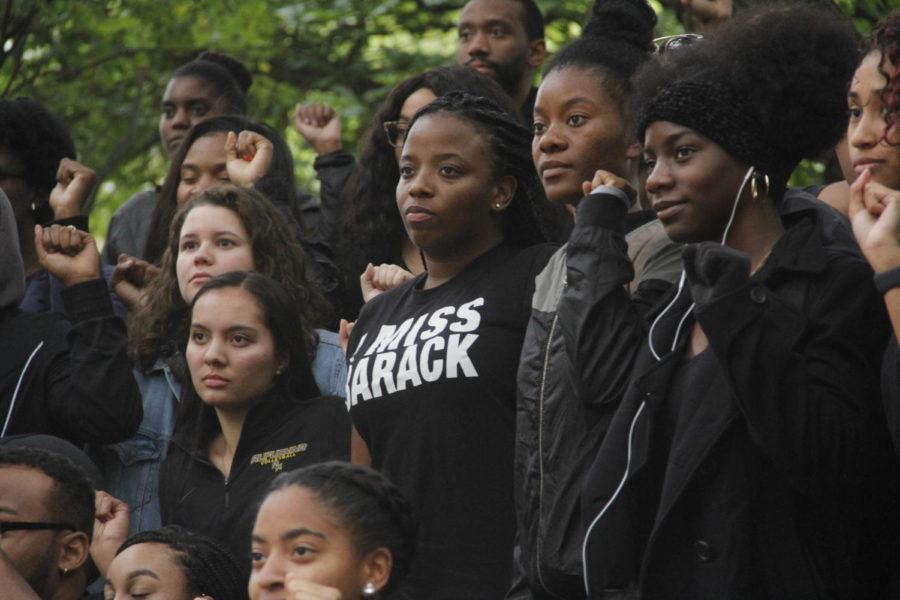Students wear all black and Nike clothing in solidarity with Colin Kaepernick
Students participate in the PWIBlackOut in support of Colin Kaepernick’s rally against police brutality and social injustices across the United States. Students showed up in black attire to represent their acknowledgement of the power of their voices. The Black Out was held in the front of the George Washington Carver building on Oct. 4.
October 4, 2018
Wearing all black, a diverse pool of roughly 65 Iowa State students gathered in front of the George Washington Carver statue adjacent to Carver Hall on Thursday.
The students, wearing all black, organized the clothing scheme in support and solidarity for the activism shown by former professional football quarterback Colin Kaepernick.
“Standing with Colin Kaepernick doesn’t mean that we’re standing against the American flag,” said Nyakota Ding, freshman in biology and pre-med. “It’s all about having everyone feel safe in their homes, safe walking around the streets, safe just doing anything they’re doing without being approached in a horrifying manner.”
Ding said it’s important for African-Americans to not be seen in negative and demeaning portrayals and continuing to endure with the negative stigmas and stereotypes that some police officers have toward African-Americans.
Participants were asked to wear all black Nike clothing, or simply all black clothing for Kaepernick’s protest of police brutality and Nike’s stance in supporting him.
Iowa State’s Black Student’s Alliance (BSA) began generating the idea of a solidarity event following a general BSA meeting on Sept. 27.
Members of the organization gathered in large discussion groups to discuss black celebrities and the latest protesting trends.
Kevin Wilson, head Big 12 delegate for BSA, said that he believed other African-American students in attendance were not providing action plans for what students could do at Iowa State.
Delegating with fellow Big 12 delegate, Chelsea Nelson, the two brought up the idea to other BSA executive board members.
“I wanted them to back me up in everything,” Wilson said of the fellow executive members. “They were mostly pretty much on board with it.”
The executive board reached out to Big 12 universities, as well other Iowa universities in hopes of their black communities to join in the solidarity.
The executive board also had planned access to the social media of the Big 12 Black Student Government and everyone decided to incorporate in what they were given.
Those in attendance were encouraged to take photos and use the hashtag #PWIBlackout.
For Kaepernick, his protests began in 2016 while he was quarterback for the San Francisco 49ers during a preseason game.
Kaepernick said his reasoning behind the protest was police brutality and the oppression of people of color in the United States.
Gaining national attention, President Trump spoke of disapproval in Kapernick’s protest at a rally in Alabama in September 2017, saying all football players kneeling should be fired.
In early September, major athletics apparel corporation Nike celebrated their 30 year anniversary of their “Just Do It” campaign by unveiling Kaepernick to be the face of the latest campaign.
Jada Alexander, freshman in biology, said wearing all black allowed attendees to make a unified statement.
“I think us all wearing black is a symbol on its own,” Alexander said. “Not because we’re mostly African-American, but just because black is a statement, and if we’re all unified wearing one color it means a lot more then if we were all to just come together wearing our own different ensembles.”
Xarius Mickens, junior in biology, said he hopes police brutality will continue to be addressed moving forward.
“Police brutality has been a long issue that’s been happening in America, and hasn’t been called attention to enough,” Mickens said. “We get a little bit of progress, and people think it’s perfect when there’s still a lot more to go.”
Samantha Gibbs, freshman in political science, said the unity of the event was meaningful.
“My favorite aspect [was] BSA coming together [and] coordinating and everybody being in high spirits, you can hear the laughter,” Gibbs said.







